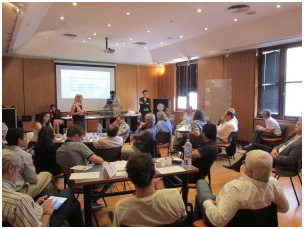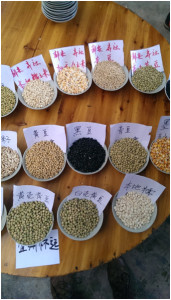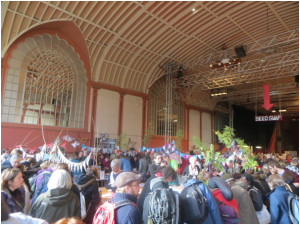By Adrian Ely, Anabel Marin and Sam Geall
Research at the STEPS Centre addresses sustainable development challenges that are felt both globally and locally. Over the last two months three events have reinforced the international linkages within our work, illustrating the interconnectedness and similarity of diverse efforts of researchers and civil society groups across the world. The three events focused on the future of seeds in sustainable agricultural systems.
Seeds – and their genetic diversity – have co-evolved alongside human civilisation since the agricultural revolution some 10,000 years ago. Even now in many parts of the world, seeds of particular species are intrinsically linked with the cultures and practices of many societies (think of the cultural significance of maize in Mexico or rice in China).
It is only over the past century that seeds have significantly started to become appropriated by corporate interests. Genetic resources have been informally ‘protected’ before (with breeders developing their own varieties and excluding their use by others) but the institutional and legal basis for private ownership is relatively new (the US passed its Plant Patent Act in 1930).
This trend towards privatisation, and its social and environmental implications, has been the focus of academic study for many decades. In addition, it has provoked widespread concern and resistance by civil society movements at local, national and international levels. Colleagues in the STEPS Consortium have recently encountered three such interlinked stories in their research in Argentina, the UK and China.

In November, our partners at the Centre for Research on Transformation (CENIT) in Buenos Aires ran a workshop on ‘The Future of Seeds in Latin America.’ This was supported by seed-funding from the ISSC ‘Transformations to Sustainability’ programme and the ESRC/Newton Fund. Argentina is currently in the middle of contentious and currently stalled debates about the reform of intellectual property law for seeds. The workshop, which benefited from broad participation from a range of busy people in the seed industry, government, civil society and the public sector research system, explored the implications of different possible scenarios of change in the law and uncovered very different framings of seeds and sustainability. It demonstrated the intense advocacy efforts in place to reverse the increased levels of privatisation demanded by certain groups. At the same time, the event made evident the strong grassroots action that is providing alternatives to the shift towards a more privatised seed system. This includes farmers engaging in seed swap events and establishing their own in situ seed conservation banks. The focus here is not on an efficient and industrialised seed system based around agricultural exports and growth, but food sovereignty and small farmer livelihoods.

STEPS colleague Sam Geall recently encountered similar debates during fieldwork conducted in South West China as part of the STEPS affiliate project ‘Low Carbon Innovation in China: Prospects, Politics and Practice’. With colleagues at the Centre for Chinese Agricultural Policy he attended a meeting of the Farmers Seed Network in Guangxi, southwest China. The topics of deliberation were broad, but included the Chinese government’s proposed new Seed Law, in which some would like to see greater protections for farmers. At the same time, the meeting included a seed exchange event at which local farmers/ seed-savers were able to exchange varieties. Many of those present represented some of China’s indigenous minority communities, and it was easy to appreciate the unique cultural heritage in which these agricultural practices were embedded.
Up till now, much STEPS work has focused on collaborative research and engagement with partners in developing countries; some might say that we spend too much time “thinking global” and not enough “acting local”. Seed funding received from the ISSC also allowed a stakeholder ‘co-design’ workshop to take place in Brighton in January. We brought together non-governmental and private sector actors to discuss pathways towards a sustainable food system for Brighton and Hove. Among the many topics covered were a proposed review of European legislation on the marketing of seed and plant propagating material that threatened the free exchange of ‘uncertified’ seed (an important activity for some of those present). Following intensive advocacy from across the EU, the Commission has withdrawn proposals for the new seed law for the time-being. At the same time, gardeners and producers in Brighton and the surrounding area are taking seed biodiversity conservation into their own hands. Seedy Sunday, the UK’s largest and longest-running community seed swap event took place this month and included talk and debates, exhibits and workshops, and a seed swap. This is a far cry from the activities that our colleagues witnessed in Argentina and China, but it demonstrates the interconnectedness of civil society movements working towards similar aims across very different regions of the world.
The STEPS Centre will continue its work around seeds and sustainability, exploring the role of citizen-led initiatives, the implications of agricultural biotechnology and GM crops and also emerging ideas around ‘open source seed innovation’ (mentioned, for example in our paper on ‘hybrid pathways to sustainability’).

A cross-regional blogpost
- This blogpost was written by colleagues working across three of the STEPS Pathways to Sustainability Global Consortium regions: Latin America, China and Europe.
- Find out more about the Consortium
- Find out more about Anabel Marin’s work at CENIT and STEPS America Latina